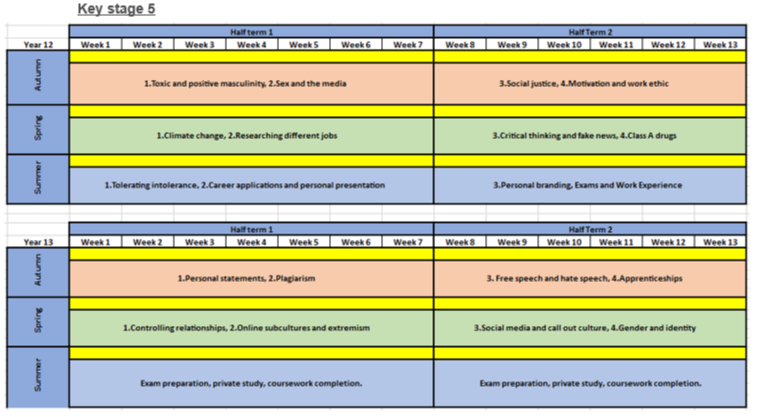PSHE & RSE
The Current Position
A proactive approach to whole school PSHE is adopted at WDS which encompasses relationships, difference and conflict resolution to promote respect and discipline. This can combat bullying, harassment and prejudice of any kind. We have reviewed the PHSE curriculum to ensure statutory requirements on health education and relationships education/Sex Education are fulfilled. RSE continues to be high profile and we have implemented this throughout multiple aspects of school life. PSHE is identified as a separate indicator for Ofsted from 2019. At present, we operate a Spiral Curriculum spanning six ‘PSHE Pillars’ that support our West Derby School Personal Growth Curriculum.
PSHE Pillars; WDS Personal Growth Curriculum
• Well-being
• Difference, Diversity and Identity
• Sex and Personal Relationships
• Personal Safety
• Growth Mind set
• Career Ready
Spiral Curriculum
We have a team of dedicated pastoral staff who deliver the programme through the pastoral system which is bespoke to the needs of our students. ‘Personal Development Days’ enrich what is already being delivered to give students a wider experience of the issues explored. Aside from our planned PSHE programme, we respond to the needs of our students and year groups as they arise, whilst also responding to National PSHE initiatives such as Mental Health awareness week and current affairs.
We work in partnership with School Improvement Liverpool, notably Julie McCann (Health and Wellbeing Officer) to ensure effective provision, good practice in delivery and support with delivering content dealing with specific issues.
Our PSHE CPD aims to:
• Support positive mental health
• Help address safeguarding issues
• Provide accredited recognition for individuals
• Raise the quality of teaching, learning and explore assessment in PSHE
• Inspire positive change within the PSHE curriculum
• Effectively support children and young people to deal with life’s challenges
Relationships, Sex and Health Education (RSE)
From September 2020, all primary age children will be taught relationships education and health education, and all secondary age children will be taught relationships & sex education (RSE) and health education.
The Department for Education has published the final guidelines covering the content of these subjects. Many parents will want to know more about these subjects, so the following simple guide has been developed that you can use to understand more about the changes CLICK HERE to view a copy.
Understanding relationships, sex and health education at your child’s school: secondary
West Derby School provides Relationship and Sex Education through the curriculum, which is delivered in timetabled, RSE/PHSE, religious studies and science lessons, form time, assemblies, and personal growth days.
Form Tutors deliver the RSE/PSHE Curriculum in dedicated RSE/PHSE lessons. Support from specialist outside agencies are used to deliver planned aspects of the curriculum. RSE lessons are set within the wider context of the PSHE curriculum and focus on the emotional aspects of development and relationships, although the physical aspects of puberty and reproduction are also included. The Science National Curriculum is delivered by staff in the science department. These lessons are more concerned with the physical aspects of development and reproduction, although the importance of relationships is not forgotten. The content of the science curriculum which deals with sex is compulsory.
As detailed by The Rt Hon Gillian Keegan’s letter to schools and parents on October 24th 2023, parents have the right to request to see the materials that are used to teach Relationships and Sex Education to their children. Should you wish to view these materials, that are delivered as part of our school’s PSHE curriculum, please send an email to the school: admin@westderbyschool.co.uk for the attention of Ms C Jones who will reply to your request.
PSHE/RSE Overview


British Values
These values are promoted not only through the curriculum but also through pupil experiences, displays, assemblies, the behaviour system, extra-curricular clubs and the Personal Growth Curriculum.
The Department for Education outlines a five-part definition of British values:
• democracy
• the rule of law
• individual liberty
• mutual respect
• tolerance of those of different faiths and beliefs
Democracy
We promote the importance of democracy through:
- The Junior Leadership Team
- Pupil Voice on key areas of school life
- Encouragement of pupils to voice their thoughts across all curriculum areas by responding to teacher feedback in books, careful questioning by staff, the work they produce and classroom dialogue
- How pupils learn about democracy in history and PHSE lessons and assemblies.
Individual Liberty
Individual liberty is promoted through:
- The introduction of pupils to a range of beliefs and issues so that they are able to make more informed choices for themselves
- Our broad and varied curriculum which equips students with the knowledge and skills to broaden the choices they make about future employment and education
- The support students receive so that they are able to make choices about the courses they will study at Key Stage 4 and Key stage 5
Rule of Law
The importance of the Rule of Law is promoted through:
- The Behaviour for Learning Policy
- The rules (Teacher’s Standards), pupils (Code of Conduct), and trustees.
- We liaise closely with outside agencies including the police
- The Acceptable Use Policy is used to promote correct use of the internet
- Students are explicitly taught the legal framework on a number of contemporary and social issues
- The Safeguarding Policy
Mutual Respect
In school we promote the importance of mutual respect through:
- The Behaviour Policy and Code of Conduct
- Curriculum areas such as RS, PSHE, MFL, English and art help students to learn about a wide range of people, cultures and beliefs
- tolerance of those with different faiths and beliefs
We promote the importance of different faiths and beliefs through:
- Our school ethos
- Our Religious Studies Curriculum
- Our PHSE Programme









